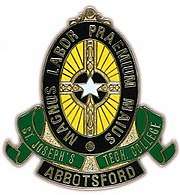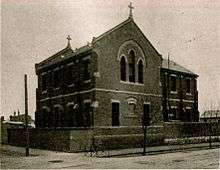St Joseph's Technical School, Abbotsford
St Joseph's Technical School, Abbotsford traces its beginnings to the opening of St. Joseph's Primary School on the same site in 1893 and was operated in the tradition of the Christian Brothers as a school for boys. In 1930 its function changed to that of a technical school. The school was formally closed in 1990.
| St Joseph's Technical School, Abbotsford | |
|---|---|
 | |
| Location | |
Melbourne , Australia | |
| Information | |
| Type | Independent technical secondary school for boys |
| Motto | Magnus Labor Praiemium Maius (Greater the effort, Greater the reward) |
| Established | 1930 |
| Founder | Irish Christian Brothers |
| Closed | 1990 |
| Campus | Abbotsford, Victoria |
| Affiliation | Roman Catholic, Christian Brothers |
School history
1892–1900

From its early beginnings as a primary school for boys the site was operated by the Christian Brothers following a tradition of rigorous teaching of both secular and religious subjects. At the first annual prize distribution night in December 1893 the local parish priest, Peter Kernan, complimented the boys, the staff and the Brothers, represented by Br O'Hagan, on the fine progress they were making.[1]
The education of girls in the local area was catered for by the Sisters of Charity, an order of nuns, who had opened St. Joseph's Primary School, Collingwood, just two years earlier. The nuns would remain in charge there from 1891 until 1993 when the first lay principal was engaged.[2]
In its first year the boys school at Abbotsford operated from a two-story, slate roofed, brick building which included a small chapel. Primary school level classes, from Year one to Year five, which itself was divided into a 'Lower Fifth' and 'Higher Fifth', were offered. The school inspectors report for 1893 regarded St. Joseph's as a school which had attained first class 'Standard of Proficiency'.[3]
1900–1930
By 1908 the school enrolment had risen to 450 pupils and the annual prize distribution night at the Collingwood Town Hall had become an annual event. Not only did this recognise those boys who had achieved high academic placings but it was also something of a spectacle encompassing gymnastics, singing, recitations and theatrical performance.[4]
A strong Australian Army Cadet unit operated sporadically for various years beginning around 1908 when it formed two Companies, A and B, of the 12th Victorian Battalion.[5] A Cadet band operated during the 1960s and the Cadets themselves remained at the school well into the 1970s.
The school enrolment remained relatively stable for some years and by 1918 it stood at 450 pupils.[6]
1930–1950
In March 1930 the structure of the school changed and it was renamed St. Joseph's Technical College, Abbotsford. By the end of that year it had an enrolment in the technical division of 104 students taught by four Christian Brothers who had trade skills experience.[7] It was to be the second Catholic technical school to be established in Melbourne following St. Joseph's, South Melbourne. Its establishment, supported by Archbishop Daniel Mannix, was designed to cater for the needs of Catholic youth from the north of the city who were seeking a trade. Between 1930 and 1937 approximately 1400 students had passed through the two schools. Around 500 boys had passed the Junior Technical Certificate examination, while an equal number had satisfied the needs for gaining an apprenticeship.[8]
To meet increasing student needs a new wing was opened in 1941. Present at the opening were Archbishop Matthew Beovich, Harold Holt and senior officials of the State government. The building, costing £3000 and equipment £850, brought the total cost of expanding the facilities at the school to £6173.[9] Given that the second world war was well underway this news was well accepted as a skills shortage in manufacturing was becoming evident.
1950–1980
The diamond jubilee of the founding of the school was celebrated in 1953. Representatives of the clergy, parents and members of the Abbotsfordonians' Old Boys association were present to share their memories of past school days. Many events were planned for that year and included visiting dignitaries such as Archbishop Matthew Beovich and past students and teachers.
1980–2000
Facing decreasing student numbers, and rising costs, the school was formally closed in 1990. Following its closure part of the site became home to the Sophia Mundi Steiner School which remained there until 2012. The site is currently used by a number of creative studios and also comprises 80 architect designed urban dwellings.[10]
Dark days
Following the closure of the school a few members of the Christian Brothers from a variety of schools were called to answer abuse allegations. These allegations occurred prior to and during a formal Royal Commission into abuse within organisations operated by religious institutions. In 2014 St Joseph's in Abbotsford was named as one of the institutions in which abuse is alleged to have occurred or in which an abuser had worked.[11]
Julian McDonald, in a newsletter published by the Christian Brothers, writes, "For us Christian Brothers, accepting the truth will mean acknowledging that a significant number of us have abused children in our care sexually, emotionally and physically. Abuse is, indeed, part of our sinful history." Members of the Congregation at a few schools caused much hurt; as McDonald says in way of explaining this, "... far too many [were] ill-equipped and ill-formed..."[12]
'Far too many were ill-equipped and ill-formed', a monumental understatement minimising the true horror of what occurred to myself my brother and many other boys during our time at St Joseph's in the 1970's(Victims of the Christian Brothers).
College crest
Based on the congregational crest of the Christian Brothers, both the primary school and technical school logos featured the school colours and motto.
Sport
Sport was an important ingredient in the education of boys attending the school and included competing in events conducted by the Combined Brothers' Secondary Schools sports association. The school was well known locally for its Australian Rules Football team which was formed by 1907 and competed in the Christian Brothers' Competition against other schools.[13] Another sport in which the school excelled was swimming.
Associated schools
Over its long history the college was associated with a number of schools at one time or another. These included primary, or feeder schools, and higher secondary colleges.
Alumni
General
- Maurice Buckley – Soldier of WW1, Victoria Cross and Distinguished Conduct Medal
- Ronald Cadee – Performer[14]
- Ronald Conway – Author[15]
- Stefan Haag OBE – Musician and director
Sport
- Charlie Cameron – Australian Rules Footballer (South Melbourne and Geelong clubs)
- Ted Cusack – Footballer (Richmond and North Melbourne clubs)
- Vin Doherty – Footballer (Collingwood, Hawthorn and Fitzroy clubs)
- Leo Maynes – Footballer (Fitzroy and Essendon clubs)
- Ray Martin – Footballer (Richmond club)
- Len Murphy – Footballer (Collingwood and Footscray clubs)
- Charlie Street – Footballer (Richmond and Carlton clubs)
- Emmett Dunne - Richmond Premiership player 1980
- Adrian Marcon - Preston Football Club Premiership player (VFA)
College principals
| Period | Name |
|---|---|
| 1893–1897 | J J O’Connor[16] |
| 1898–1899 | ? |
| 1900–1910 | G L Blake[16] |
| 1911–1914 | C L Whiting[16] |
| 1915–1917 | ? |
| 1918–1922 | F P O’Driscoll[16] |
| 1923–1924 | M C Carey[16] |
| 1925–1926 | C L Maloney[16] |
| 1927 | J C Fanning |
| 1928–1929 | J J Bradley[16] |
| 1930–1939 | A B Hanley[16] |
| 1940–1941 | L B McKennariey[16] |
| 1942 | R M McGrath[16] |
| 1943 | V M Doran[16] |
| 1944–1947 | G G Maguire[16] |
| 1948–1951 | W K Butler[16] |
| 1952–1953 | A F Webster[16] |
| 1954–1955 | T J O’Farrell[16] |
| 1956 | K P Kent[16] |
| 1957–1958 | J B McDonogh[16] |
| 1959 | D M Boulter[16] |
| 1960–1965 | A F Webster[16] |
| 1966–1968 | G T Barfield[16] |
| 1969–1971 | J B Doudes[16] |
| 1972 | P M Prendergast[16] |
| 1973 | G R Donohue[16] |
| 1974–1975 | F M Chappell[16] |
| 1976–1977 | J B Hoye[16] |
| 1978–1983 | D S Herrick[16] |
| 1984–1990 | T J Parton[16] |
See also
- List of schools in Victoria
- Education in Australia
- Congregation of Christian Brothers
References
- "CHRISTIAN BROTHERS' SCHOOL (ST. JOSEPH'S), ABBOTSFORD". The Advocate. XXVI (1301). Melbourne. 30 December 1893. p. 6. Retrieved 1 March 2016 – via National Library of Australia.
- Taylor, Patricia. 150th Anniversary History Book. (webpage) Retrieved on 3 March 2016
- "REPORT ON THE CATHOLIC PRIMARY SCHOOLS OF THE ARCHDIOCESE OF MELBOURNE FOR 1893". The Advocate. XXVI (1299). Melbourne. 16 December 1893. p. 7. Retrieved 1 March 2016 – via National Library of Australia.
- "CHRISTIAN BROTHERS' SCHOOL, ABBOTSFORD". The Advocate. Melbourne. 4 January 1908. p. 16. Retrieved 4 March 2016 – via National Library of Australia.
- "CATHOLIC SCHOOLS' CADET MOVEMENT". The Advocate. XL (2057). Melbourne. 4 July 1908. p. 19. Retrieved 2 March 2016 – via National Library of Australia.
- Souvenir of the Golden Jubilee of the Christian Brothers in Australasia. Sydney, Brooks.
- "St. Joseph's College, Abbotsford". The Advocate. LXII (4036). Melbourne. 24 December 1930. p. 20. Retrieved 2 March 2016 – via National Library of Australia.
- "SKILLED TRAINING FOR CATHOLICS". The Argus (28, 286). Melbourne. 19 April 1937. p. 11. Retrieved 3 March 2016 – via National Library of Australia.
- "Catholic Technical Education Progresses". The Advocate. LXXIV (4567). Melbourne. 27 February 1941. p. 5. Retrieved 1 March 2016 – via National Library of Australia.
- St Joseph's, Abbotsford (webpage) Retrieved on 2 March 2016
- Henderson, Fiona (May, 2014) Child sex abuse victims name 17 institutions for Royal Commission submission. (webpage) Retrieved on 2 March 2016
- Julian McDonald, 2013. Meeting a difficult challenge. in Oceania Updates Vol. 6 No. 127. Christian Brothers, Oceania Province.
- "WEEKLY JOTTINGS". The Australasian. LXXXII (2, 149). Victoria, Australia. 8 June 1907. p. 27. Retrieved 4 March 2016 – via National Library of Australia.
- "THEATRE . MUSIC". The Advocate. LXXXIV (5026). Melbourne. 22 November 1951. p. 14. Retrieved 1 March 2016 – via National Library of Australia.
- Scourge of our national psyche. (webpage) Retrieved on 2 March 2016
- O'Halloran, John P. (Research notes for past principals of St Josephs Tech.) Christian Brothers Archives, Treacy Centre, Parkville